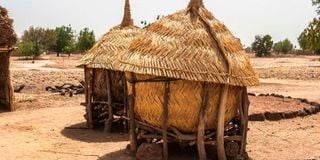Mr Survivor: Why I'm proud of my mother’s trapezium granary that has stood the test of time

The granary has not just been my mother’s museum, but mine too, though no one mentions my name, for fear of contradicting her claims that she put it up by herself.
Growing up under the matronly authority of my mother was like growing up in a military training camp. She did not allow me, her first born, a chance to enjoy the privilege of boyhood exploration in making cars and aeroplanes from wires and old pieces of metal. Such boys’ adventures, according to her, were for the bad boys who would turn out to nothing. And now, so many years later, I am mesmerised by my weather-beaten Volkswagen Beetle when other men have since moved on from hard metallic cars to soft plastic ones; you should know where I am coming from.
You see, my mother believed, and still believes, in real physical work done using one’s hands. “Education of letters is useless without education of life,” she would unfailingly pontificate. And so I grew up on a diet of proverbs that were meant to make me follow the narrow path, her favourite being, “One’s mother is their second ‘god’”. When the proverbs seemed to get in me through one ear and escape through the other, as was wont to happen with yours truly, mother would gladly beat any sprouting elements of moral and physical laziness out of me by use of various military weapons of body destruction at her disposal. My near fatal encounter with her militarism is a story for another day.
“What kind of a man are you if you cannot repair a broken fence?” she would ask. “I will not stand to watch my children become nothing like some people I know.” For a long time, I kept wondering what broken fence she was referring to until one day she decided to show me in a typical military drill. “Today you are going to construct a granary for me if you are a man!” Now, the way the words were thrown to me served both as a challenge and an insult. That was her way of provoking me to dare things that were beyond my mental and physical ability.
I took three days assembling poles, rafters and straps from the bark of a mukeu (sterculiaceae tree). The straps were used in place of nails. The fourth was a bit difficult because it involved taking measurements for the holes, like I had seen real fundis do. In the absence of my father, who worked in town, I was the man of the house, and I enjoyed the privilege of giving orders to my younger brothers and sisters to pass to me one item or other as I erected the skeleton of the house. I had spent the previous night planning how to use a string to take measurements because a tape measure was alien in this side of the world. I spent quite some time marking the dimension of the structure in an effort to attain a relative of rectangle.
“Use your eyes! What are they for?” mother shouted. Without the use of any measuring instruments, which in any case I would not know how to handle, I used my eyes as mother had said. I had seen my father close one eye to mark a straight line. By mid-day of the fourth day, I was done with a skeleton of a house. The result was a trapezium in place of a rectangle.
That done came the most difficult part, the ‘cooking’ stage. This involved mixing soil with water to make mud for the walls. “Where does the ugali you eat go to? I had stared at the heap of soil as my brothers and sisters continued to add water. “Dance on top of the heap until the mud is fully cooked!” she shouted. And she unceremoniously pushed me into the big pit which I had dug to get the soil. I tried one major jump into the ‘hill’ of soil and miserably got stuck, sending everyone, including my mother, into a fit of laughter. Tears of mental pain, defeat and embarrassment threatened to fall from the drums inside my head but I knew better. A man was not supposed to cry.
I tried doing the said dance by approaching the ‘hill’ from the edges and with one leg until it was cooked enough for dancing on. When I made one successful Maasai jump, everyone cheered me up and I knew I was a man. And just like that, the arrogant trapezium construction stood crying for mother, an expert in thatching houses, to give it justice. And since then, it became my mother’s house. She has been telling anyone who cares to listen that she did it single-handedly, and attempts by my father to bring it down have been resisted, even after all the other houses were replaced with modern buildings.
And that arrogant construction has not just been my mother’s museum, but mine too, though no one mentions my name, for fear of contradicting her. That disaster waiting to happen has been my souvenir that marks my graduation as an architect and a structural engineer in one. It was my first port of call to take Queen when I first took her home. Unfortunately, she never appreciated my architectural marvel.
To this day, I have not known any better than to swim in the footprints of my mother’s indefatigable spirit. My mother Queen Bee.





